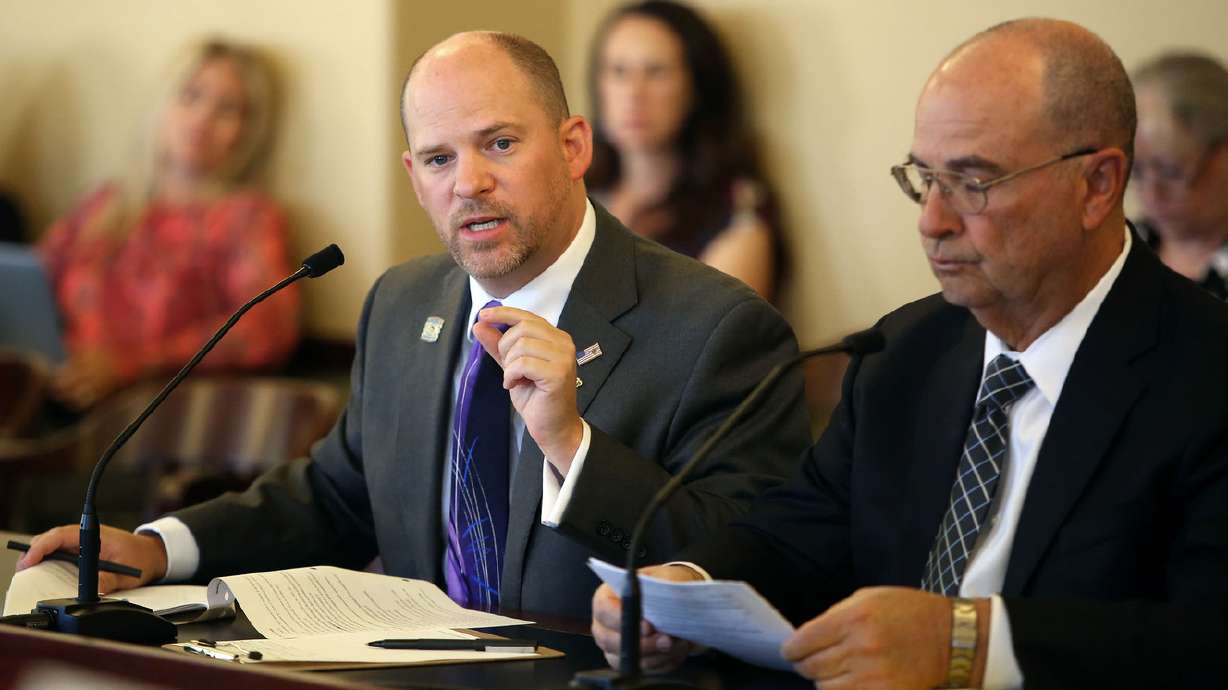Estimated read time: 4-5 minutes
This archived news story is available only for your personal, non-commercial use. Information in the story may be outdated or superseded by additional information. Reading or replaying the story in its archived form does not constitute a republication of the story.
SALT LAKE CITY — A state senator has introduced a bill that would stiffen the punishment for crimes targeting people because of their personal characteristics, including sexual orientation or gender identity.
After lawmakers voted down a controversial hate crimes proposal last year, Sen. Daniel Thatcher, R-West Valley City, made good on his vow to bring back a new version of the legislation, though he's doing everything he can to avoid calling it a hate crimes bill.
"That terminology is simply not accurate. It's what people call it because it's the closest reference that they have. But in reality we are recognizing that some people are more dangerous than other people," he said, adding that the bill is about criminal justice, not social justice.
Thatcher said specifically targeting someone because of who they are is unacceptable.
SB72 would allow prosecutors to seek a one-step increase for offenders convicted of a crime against a person or their property based on a belief or perception of the victim's ancestry, disability, ethnicity, gender, gender identity, national origin, race, religion or sexual orientation. A class A misdemeanor, for example, could become a third-degree felony at the time of sentencing.
The proposed law aims to protect free speech and other constitutional rights in that what a person says or posts on social media could not be used against them in court, unless it's directly tied to the crime or to disprove a lie. It doesn't create a new protected class of people except for the purpose of enhanced penalties.
Thatcher said offenders would have to "pretty much" confess for the law to be applied.
"If you're trying to make people afraid, the best way to do that is to tell them, 'I'm targeting people like this,'" he said, citing a "beat-black-people Thursday" as an example. "We don't have to guess what you think because you're going to tell us, and that's how we catch you and that's how we prosecute you."
The Sutherland Institute, a conservative public policy think tank, opposed the legislation last year and isn't sold on Thatcher's proposal this year.
The bill needs to be part of a broader conversation and a "balanced" approach, something Utah has shown it can navigate regarding LGBT rights and religious liberty, Sutherland President Boyd Matheson said.
"I think the bill … probably goes down the path of the culture wars, and that's not helpful to the community," he said. "If all we're doing is something that goes back to the culture wars, then we're not advancing anything."
Related:
Matheson said the bill needs complementary legislation to protect religious liberty, noting that some Christian student groups in California aren't allowed to meet on campus because they're deemed intolerant.
"When we talk about tolerance, we really have to talk about tolerance. That's a multiway street. This is not exclusive to the LGBT community either," he said.
Troy Williams, executive director of Equality Utah, said the state's current law is "woefully" inadequate and doesn't protect anybody. There's a lot of misunderstanding about what a hate crime law is, he said, adding that the proposal would protect Mormons the same way it would protect gay people.
"In some people's minds who haven't studied the issue, they see it as thought crime," he said. "I think the relabeling it from Thatcher's point of view is to really address the intent, which is the victim selection."
Williams said it's important to get past old ideas and fears that people have had about the legislation and get to the core of what it's really about.
"If there's a Mormon guy who beats up a gay guy, people will say obviously because he's Mormon he must therefore have this propensity. We want to avoid that kind of stuff because it's not accurate, and it's not germane to the actual crime," he said.
Prosecutors don't use Utah's current hate crimes law because they say it's unenforceable and has no teeth.
Thatcher said he doesn't expect his proposed law would be applied often if lawmakers pass it. But it would send a message to overlooked communities that the state cares.
"Very seldom do you see a hate crime," he said, "but when they happen, they are devastating to the group that is impacted. There are groups out there who feel we don't care about them, and that's a tragedy."









